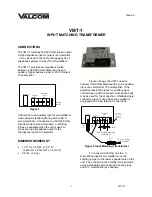
CMT2157A
Rev 0.8 | Page 19/31
www.cmostek.com
Normal Packet
The traditional 1527 packet contains a 32-symbol Sync, a 20-bit Address (Sync ID) and 4-bit Data. CMOSTEK has defined a
1527 Study Packet to support the ID study in 1527 mode. The traditional packet introduced here is called the “Normal Packet”.
Address (Sync ID)
configurable 20 bits
D0
1 bit
D1
1 bit
D2
1 bit
D3
1 bit
Sync
32 symbols
Figure 17. 1527 Normal Packet Structure
Study Packet
The 1527 Study packet contains a 32-symbol Head_S and a 20-bit Address (Sync ID), as shown below.
Head_S
32-symbol
Address (Sync ID)
20 bits
Figure 18. 1527 Study Packet Structure
Bit Format
In 1527 packet, a single bit is constructed by 4 symbols, as shown below. The user can select the desired value of the “Bit
Format” parameter on the RFPDK. Please note that only the Sync ID field and the D0, D1, D2, D3, D4, D5, D6 field have the
unit of “bit”.
1 SYM
1 SYM
3 SYM
3 SYM
Bit 1
Bit 0
Figure 19. 1527 Bit Format Options
5.7.3 2262 Packet Structure
ID Study is not supported in 2262 mode. Only one packet structure is supported.
Table 15. Configurable Parameters in 2262 Packet
Parameter
Descriptions
Default
Mode
Address (Sync ID)
Length
This is the range of the Sync ID Length. The range is from
6 to 11 bits. This parameter also defines the number of
data bits, because the total number of Sync ID and Data
bits is fixed at 12.
8-bit
Basic
Advanced
Address (Sync ID)
Value
The value of each bit of the Sync ID can only be
represented by 0, 1 or f.
00000000
Basic
Advanced
In the traditional 2262 format, 4 OSC clocks (1 OSC clock cycle is notated as 1
α
) are equal to 1 symbol. By using the
CMOSTEK products, the user does not need to adjust the OSC to define the symbol rate, because the symbol rate is directly
programmed. The Bit Format is fixed at 8 symbols per bit.
Normal Packet
The traditional 2262 packet contains an Address (Sync ID), a Data, and a 32-symbol Sync.













































